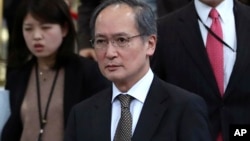Japan said Monday that it is sending back its ambassador to South Korea despite an ongoing impasse over a "comfort woman" statue, stressing that it is not meant to be a compromise.
Foreign Minister Fumio Kishida announced that Ambassador Yasumasa Nagamine will fly back to Seoul on Tuesday, along with the consul-general in the South Korean city of Busan.
Kishida said Japan made the decision because of the need to study and develop ties with a new government succeeding ousted South Korean President Park Geun-hye amid North Korea's missile threat. He said Japan regrets that South Korea has not complied with what was supposed to be a final agreement to resolve their differences over the comfort woman issue in late 2015, and that the ambassador will be working to make sure the new administration respects the deal.
Before and during World War II, Japan forced many Korean and other women in Asia to work in brothels for the Japanese military in what was known as the "comfort woman" system.
"The agreement is a promise that the two countries made to international society. We must sincerely implement it," Kishida said.
Japanese officials said sending the envoys does not mean Japan is caving in to South Korea's refusal to remove the statue.
Chief Cabinet Secretary Yoshihide Suga said Japan's other retaliatory actions, such as the suspension of some negotiations with South Korea, including a proposed currency swap arrangement for times of financial crisis, will stay in place. He said sending back the envoys also reflected Japan's concerns over the safety of Japanese nationals in South Korea ``when the political situation is extremely uncertain.''
South Korea will hold an election on May 9 to elect a new president to replace Park, who was impeached and later arrested amid a massive corruption scandal.
Japan recalled the ambassador and the consul-general in January in response to the placing of the statue outside of Japan's consulate in Busan.
Activists in South Korea oppose the agreement. A comfort woman statue put up outside the Japanese Embassy in Seoul in 2011 remains in place, and activists installed a similar statue by the same sculptor in Busan in December.
Japan Envoy Recalled Over Statue Flap to Return to S. Korea

TOKYO —



